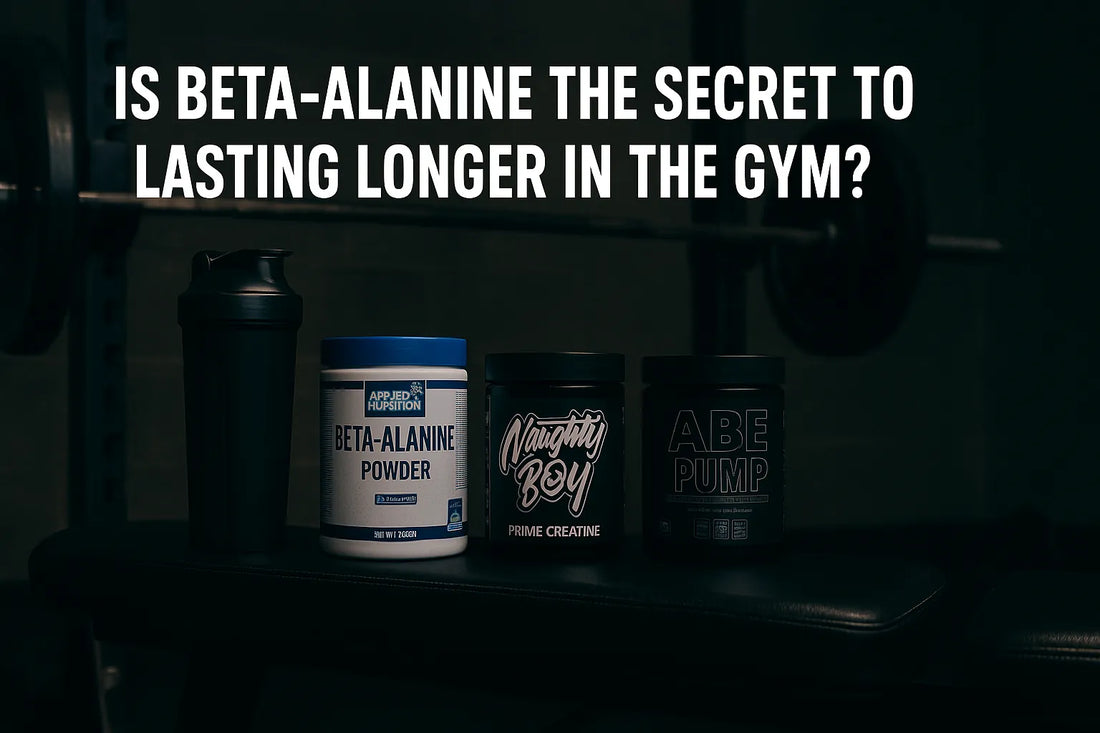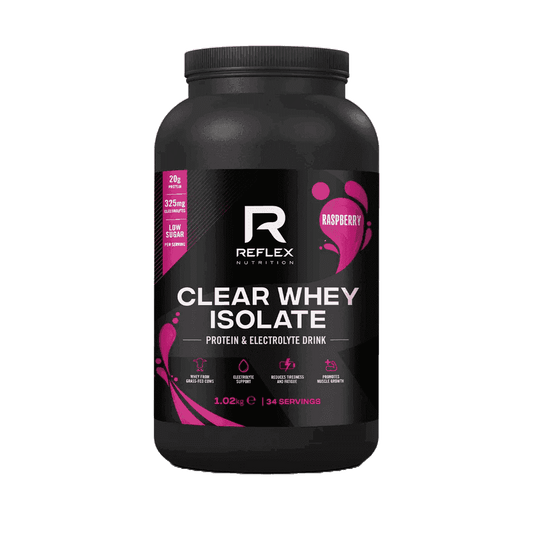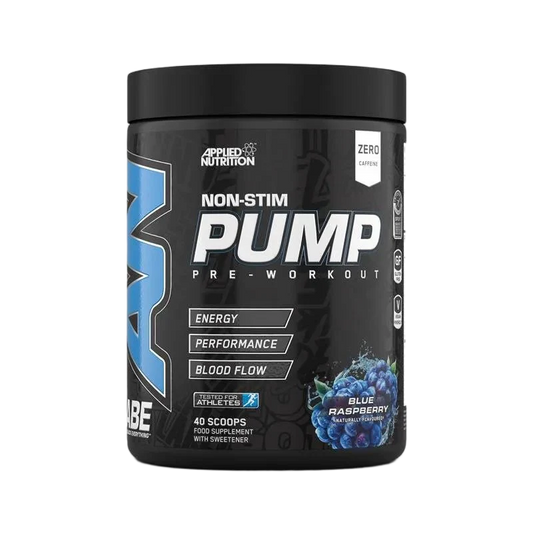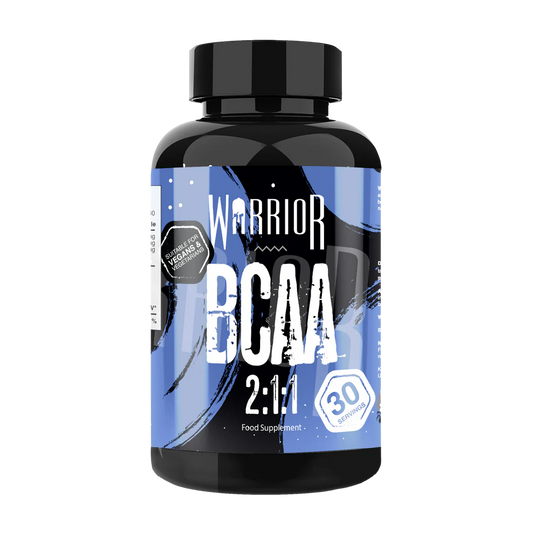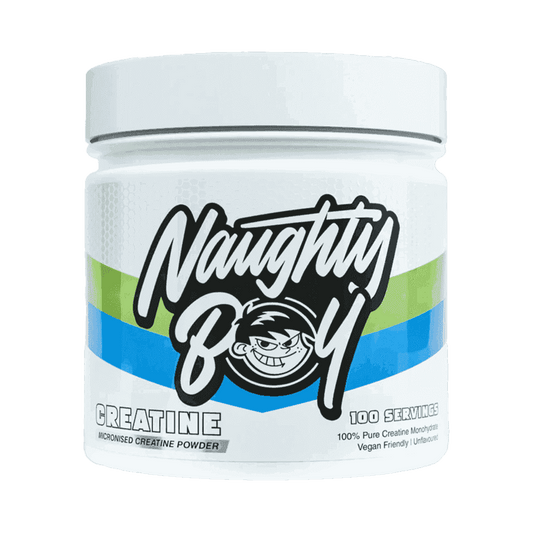Is Beta‑Alanine the Secret to Lasting Longer in the Gym?
Introduction:
Beta-alanine is one of the most searched gym supplements in the UK — but does it live up to the hype?
Whether you’re training for endurance, hypertrophy, or just trying to get one more solid set, beta-alanine keeps coming up as a go-to for lasting longer in the gym. This blog breaks down how it works, what it pairs best with, and whether it’s worth adding to your stack.

1. What Does Beta-Alanine Actually Do?
Beta-alanine is a non-essential amino acid. It doesn’t directly build muscle, but it supports the production of carnosine, a compound that helps reduce acidity in your muscles during exercise. When acid builds up (think: lactic acid burn), fatigue sets in. Carnosine buffers that acid — which means you can train longer, especially at high intensities.
Unlike caffeine or other fast-acting pre-workouts, beta-alanine works best when taken daily, allowing carnosine levels to build up in muscle tissue over time.
⚡ Benefits of Beta-Alanine at a Glance:
|
Benefit |
How It Helps |
|
Delays muscle fatigue |
Extends your sets and total volume |
|
Improves endurance |
Ideal for supersets, circuits, and CrossFit-style training |
|
Enhances muscular buffering |
Reduces acid build-up, especially in high-rep work |
|
Stacks well with creatine |
Combines short-burst and long-effort performance |
2. How Long Does It Take to Work?
Beta-alanine isn’t instant.
To feel the real performance benefits, most people need to take it consistently for 2–4 weeks at a dosage of 3.2–6.4g per day.
Once your carnosine levels are high enough, the difference is clear:
-
More reps
-
Less burn
-
Longer time to exhaustion
Many gym-goers pair beta-alanine with Naughty Boy Prime Creatine, which supports ATP regeneration for short bursts, while beta-alanine tackles longer muscle-endurance efforts. It’s an effective, well-supported duo.
3. Does It Make You Tingle?
Yes — and that’s totally normal.
The tingly or itchy sensation some people experience is called paresthesia. It’s harmless, temporary, and usually kicks in when you take over 2g at once. If you don’t enjoy it, split your dose throughout the day or take it with food.
That sensation isn’t a sign that it’s “working” — it’s just your nervous system reacting to high concentrations. Some people love it as a pre-workout trigger. Others prefer to avoid it.
If you’re looking for a smoother ride, Applied Nutrition Beta-Alanine Powder (300g) makes it easy to tailor your dose. Start low, then work your way up.

4. Can You Take It With Creatine?
Definitely.
In fact, creatine + beta-alanine is one of the most researched and effective stacks in all of sports nutrition.
|
Supplement |
Primary Effect |
|
Creatine |
Recycles ATP for explosive strength |
|
Beta-Alanine |
Buffers acid for endurance and volume |
When used together, they offer full-spectrum performance benefits — from lifting heavier to lasting longer.
Some gym users also stack beta-alanine with Reflex Clear Whey Isolate, ensuring recovery stays on pace with performance. Others combine it with ABE Pump Non-Stim, which contains pump-enhancing ingredients minus the caffeine, allowing for clean, focused sessions.
5. When Should You Take Beta-Alanine?
The timing isn’t as critical as consistency.
Beta-alanine doesn’t need to be taken right before training. Since its effects are cumulative — raising muscle carnosine over time — the best strategy is daily use, even on rest days.
Many athletes take their beta-alanine with a meal or protein shake. For convenience, you can mix Applied Nutrition Beta-Alanine Powder into your morning smoothie, or take it with your creatine dose post-workout.
Some people still prefer to use it pre-workout for the tingles and routine. The bottom line?
Get it in daily — timing is secondary.
6. How Long Does the Tingle Last?
That tingling (paresthesia) typically peaks 15–20 minutes after taking beta-alanine and wears off within an hour.
While completely safe, it can be distracting for some. If that’s you:
-
Split your dose (e.g. 1.5g in the morning, 1.5g later in the day)
-
Take with food
-
Choose capsule-based products like Warrior BCAA capsules, which may reduce the tingling effect due to slower absorption.
Some lifters even view the tingle as a psychological trigger to start lifting — like caffeine jitters without the crash.
7. Do You Need to Cycle It?
Unlike stimulants, beta-alanine doesn’t need cycling.
There’s no tolerance build-up, no hormonal side effects, and no need to “come off.” However, if you're using it year-round, it’s smart to reassess every few months. You might:
-
Lower your dose during deload weeks
-
Take a 1–2 week break after a long cycle
But most gym-goers take it continuously without issue.
8. What Are the Downsides?
Let’s be clear: beta-alanine is one of the safest and most researched supplements available. Still, here are the minor downsides to consider:
|
Potential Issue |
Explanation |
|
Tingling (paresthesia) |
Harmless but uncomfortable for some users |
|
Requires daily dosing |
Unlike caffeine, it doesn’t “kick in” instantly |
|
No direct muscle gain |
Works via endurance, not hypertrophy |
For users focused on strength and volume, these are minor trade-offs — especially considering the upside.
9. Does It Work for Beginners?
Yes — and perhaps even more so.
New lifters often struggle with muscular endurance and burn out in later sets. Beta-alanine helps push past that fatigue, allowing beginners to improve work capacity faster.
It’s not a must-have on day one, but if you’re already training consistently, beta-alanine is a smart addition. Think of it like adding gears to your engine — not essential, but it’ll help you move faster, longer, smoother.
It also blends easily into a beginner’s stack with:
Together, they support hydration, strength, endurance, and recovery — no need to overcomplicate it.

10. Creatine vs Beta-Alanine: Which One Should You Take?
This isn’t an either/or situation — the best athletes use both.
But if you had to choose based on training goals:
|
Goal |
Best Pick |
|
Explosive power & 1–5 reps |
Creatine |
|
Muscle endurance & volume |
Beta-Alanine |
|
Maximise work capacity |
Both together |
They complement each other, much like caffeine + L-citrulline do in stim-based pre-workouts.
For those sensitive to caffeine or training late, the ABE Pump Non-Stim formula delivers both pump and endurance without any buzz — a clean base to build on with beta-alanine.
11. Final Verdict: Is Beta-Alanine Worth It?
If you train hard, chase volume, or want to squeeze out every last rep — beta-alanine is a no-brainer. It won’t turn you into a superhero overnight, but it shifts the fatigue curve just enough to increase reps, sets, and intensity over time.
And in the gym, progress is cumulative.
Paired with creatine, clear whey, and pump support, beta-alanine becomes part of a smarter training toolkit. You’re not chasing a buzz — you’re building a better engine.
FAQs:
1. Does beta-alanine really help you train longer?
Yes. It raises carnosine levels in your muscles, which buffers lactic acid and delays fatigue — allowing you to push through more reps or longer sessions.
2. How fast does beta-alanine start working?
It takes 2–4 weeks of consistent daily use to start feeling the endurance benefits. It’s not an instant boost like caffeine.
3. Why does beta-alanine make my skin tingle?
That tingling is called paresthesia — a harmless side effect caused by rapid nerve firing. It usually fades within an hour and can be reduced by splitting the dose.
4. Should I take beta-alanine on rest days?
Yes. Daily use is essential to build up muscle carnosine levels, even if you’re not training.
5. Can I take creatine and beta-alanine together?
Absolutely. They work through different mechanisms and complement each other — one supports strength and power, the other endurance.
6. Is beta-alanine safe for beginners?
Yes. It’s well-tolerated, non-stimulant, and widely researched. Start with 2–3g daily and build from there if needed.
7. What’s the best time of day to take beta-alanine?
There’s no perfect time. Morning, afternoon, pre- or post-workout — as long as you’re consistent, the timing doesn’t matter much.
8. Do I need to cycle beta-alanine?
No. It can be taken year-round without building tolerance. Some people choose to pause during deloads, but it’s not required.
9. Can beta-alanine improve cardio performance?
Yes, especially during high-intensity interval training (HIIT), circuits, or conditioning work where muscular endurance is challenged.
10. Does beta-alanine build muscle?
Not directly — it doesn’t increase protein synthesis. But it helps you train harder and longer, which indirectly supports muscle growth.

